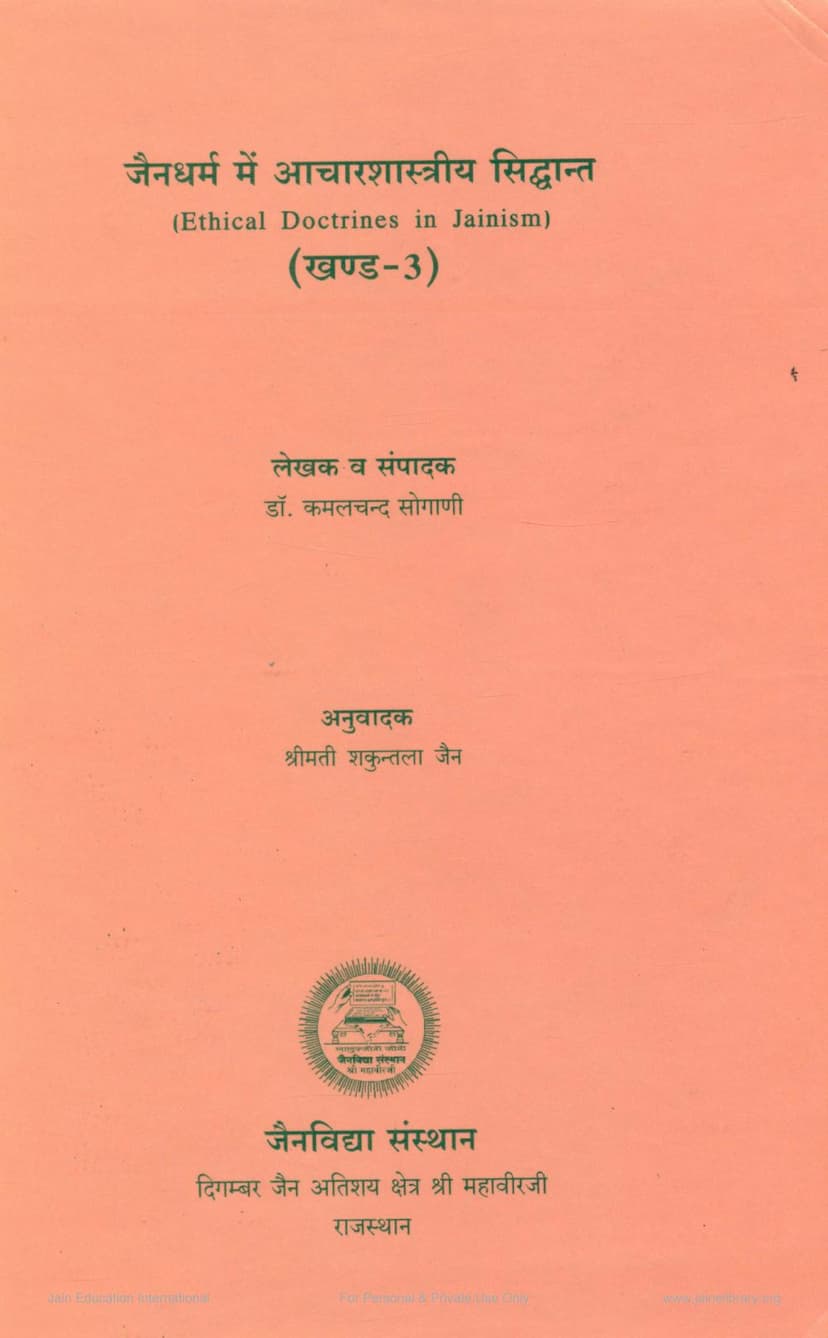Jain Dharm Me Aachar Shastriya Siddhant Part 03
Added to library: September 2, 2025

Summary
This document is the third volume of "Ethical Doctrines in Jainism" (Jain Dharm me Aachar Shastriya Siddhant Khand-3), authored by Dr. Kamal Chand Sogani and translated by Mrs. Shakuntala Jain, published by Jain Vidya Sansthan, Digamber Jain Atishay Kshetra Shri Mahavirji, Rajasthan.
This volume is part of a larger work, with previous volumes covering historical background, the philosophical basis of Jain ethics, right faith and the seven tattvas, and the conduct of householders (Volume 1), and the conduct of ascetics and the mystical significance of Jain ethics (Volume 2). This third volume focuses on the comparative study of Jain ethical principles with other Indian and Western ethical traditions, and their relevance to contemporary issues.
Here's a breakdown of the content based on the provided text:
Key Themes and Chapters:
The book is structured into ten chapters, with this third volume containing chapters seven through ten, along with a summary.
-
Chapter 7: Jain and Non-Jain Indian Ethical Doctrines (Page 63-75): This chapter presents a comparative analysis of Jain ethics with other Indian philosophical systems, including:
- Upanishads and Bhagavad Gita: Discusses concepts like Preya (pleasurable) and Shreya (auspicious) paths, the nature of the ultimate reality (Brahman/Atman), the pursuit of bliss, and the distinction between higher and lower knowledge (Para Vidya and Apara Vidya). Similarities and differences with Jain concepts like Samydadarshan (right faith), Samydagyana (right knowledge), and Samydacharitra (right conduct) are explored. The concept of Bhakti (devotion) in Jainism is also examined in relation to its presence in other traditions.
- Vedanta, Purva Mimamsa, Nyaya-Vaisheshika, Sankhya-Yoga, and Early Buddhism: Compares the understanding of liberation (Moksha) and ignorance (Avidya) across these schools. The chapter highlights commonalities in their understanding of ethical ideals, the obstacles to spiritual progress, the importance of a guru, and the path to spiritual realization.
- Yoga's Eight-Limbed Path and Buddha's Four Noble Truths: Examines the similarities and differences between the yogic path (Yama, Niyama, Asana, Pranayama, Pratyahara, Dharana, Dhyana, Samadhi) and Jain practices, as well as the Four Noble Truths of Buddhism and their correspondence with Jain principles like karma, the causes of suffering, the cessation of suffering, and the path to liberation.
- The Importance of Faith, Knowledge, and Conduct: Emphasizes the foundational role of faith (Shraddha), knowledge (Gyana), and conduct (Charitra) in spiritual progress, drawing parallels between Jain and Vedic traditions.
- The Negative and Positive Aspects of Conduct: Discusses the renunciation of sins and passions, control of the senses and mind, and the cultivation of virtues, including meditation and devotion.
- Mystical Aspects and the Path to Liberation: Explores the characteristics of a realized mystic and the stages of spiritual development.
-
Chapter 8: Types of Jain and Western Ethical Doctrines (Page 76-75 - Note: Page numbers seem to be out of order here): This chapter shifts focus to Western ethical thought, comparing Jain ethical principles with:
- The Origins of Ethics in the West: Traces the beginnings of ethical thought in Greece, starting with the Sophists.
- Key Western Philosophers: Discusses the ethical contributions of the Sophists (Protagoras), Socrates, Plato, Aristotle, Bentham, Mill, and Kant.
- Ethical Ideals and Virtues: Compares the understanding of ethical ideals and the classification of virtues (personal, social, spiritual) across these Western thinkers and Jainism.
- The Sophists: Criticizes their relativistic ethics and contrast it with Jainism's objective ethical standards.
- Socrates: Discusses his emphasis on knowledge as virtue and its limitations compared to Jainism's understanding of the role of passions.
- Plato and Aristotle: Explores their ideas on the harmony of different parts of the soul and the middle path, relating them to Jain concepts of Anuvratas.
- Bentham and Mill: Examines utilitarianism and its differences from Jain ethics, particularly the concept of maximizing happiness for all rather than just the majority.
- Kant: Discusses his categorical imperative and contrasts it with Jain principles, highlighting the importance of emotions and compassion in Jain ethics.
- Classification of Virtues: Details the Jain categorization of virtues into personal, social, and spiritual qualities.
-
Chapter 9: Jain Ethics and Present Problems (Page 76-84): This chapter applies Jain ethical principles to contemporary societal issues:
- Individual and Society: Argues that Jain ethics encompasses both individual spiritual growth and social well-being, with monks contributing to society through their spiritual merit.
- The Concept and Functions of the State: Discusses the ideal of a state-less society achievable through the practice of Jain vows, but acknowledges the necessity of a state due to human imperfections. It emphasizes the state's role in facilitating social order and development.
- Virtues of the State: Proposes that the state should embody virtues derived from Jain principles like Ahimsa (non-violence), Anekanta (non-absolutism), truthfulness, non-stealing, celibacy, and non-possession. These virtues are seen as crucial for resolving national and international conflicts and promoting peace and welfare.
- Caste System: Criticizes the caste system from a Jain perspective, asserting that true worth is based on conduct and spiritual attainment, not birth, and that humanity is the only true caste.
-
Chapter 10: Summary (Page 85-94): This chapter provides a concise overview of the entire work, reiterating key Jain ethical principles, their philosophical underpinnings, the distinctions between householder and monastic conduct, the significance of virtues, and the comparative analysis with other ethical systems. It highlights the foundational role of Jain metaphysics in shaping its ethics, the importance of right faith, knowledge, and conduct for liberation, and the comparative insights gained from studying other traditions.
Overall Objective:
The book aims to provide a comprehensive and systematic exposition of Jain ethical doctrines, exploring their philosophical basis, practical applications, and comparative relevance to other major ethical systems, both Indian and Western. It emphasizes the interconnectedness of Jain metaphysics, ethics, and spirituality, and seeks to demonstrate the applicability of Jain principles to modern-day challenges. The translation into Hindi makes this scholarly work accessible to a wider audience.